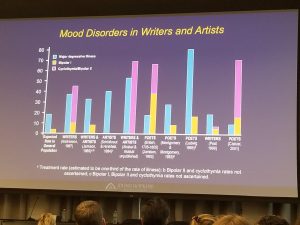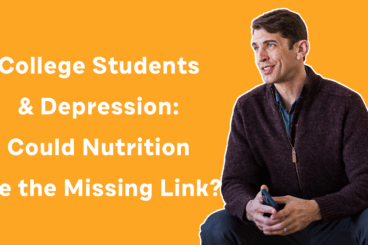Last month, the Departments of Psychiatry and Journalism at Columbia University organized the first Columbia Conference on Mental Health Journalism & Media. The room was filled with award winning journalists and psychiatrists, researchers, mental health advocates, students, film makers and other mental health professionals.
I was honored to play a part in organizing the day and to host a panel discussion on Innovative Mental Health Journalism & Media with panelist Sarah Smith, Carter Center Mental Health Journalism Fellow, MH investigative reporter at Houston Chronicle; Dr. Ali Mattu, clinical psychologist, Columbia, host of the “The Psych Show”; Taylor Eldridge, Ida B. Wells Fellow at the Investigative Fund; and Dr. Vania Manipod, California psychiatrist who promotes mental health through social media.
 During her presentation Dr. Elizabeth Ford, chief of Psychiatry for Correctional Health Services for New York City’s Health + Hospitals, reflected on the group that had come together and commented, “Journalism is about relationship building, and that’s exactly what psychiatry is about…. We’re both storytellers. Psychiatrists, at their core, are storytellers… helping patients find their own story and create a narrative that makes sense.”
During her presentation Dr. Elizabeth Ford, chief of Psychiatry for Correctional Health Services for New York City’s Health + Hospitals, reflected on the group that had come together and commented, “Journalism is about relationship building, and that’s exactly what psychiatry is about…. We’re both storytellers. Psychiatrists, at their core, are storytellers… helping patients find their own story and create a narrative that makes sense.”
Throughout the day we heard how the presenters weaved together stories of mental health, from their own to their patients and subjects, and the importance of sharing those stories for bringing justice, enacting policy change, creating connection, fighting stigma and humanizing the voices of some of the most silenced people in our society.
We are hopeful that creating a space for journalists and psychiatrists to come together will help increase the presence of powerful media pieces about mental health and illness and break the stigma of sharing our stories.
The speakers and panelists are some of the deepest thinkers about mental health and challenged me to think and do more. You can see for yourself: A recording of the conference is available here.
Listen to the panel I moderated on innovation at 1:17:30.
Listen to Stephen Fried’s interview of Andrew Soloman at 3:53:00
Listen to Kay Jamison speaking about her new book and the connection between bipolar disorder and creativity at 6:37:30

Below is a full list of presenters, their bios and samples of their work. I hope you find what they have to share as inspiring as I do.
Pam Belluck
Pam Belluck is an award-winning health and science writer for The New York Times, whose recent honors include sharing a Pulitzer Prize and other national awards for coverage of Ebola. She was selected to be a Ferris Professor of Journalism at Princeton University, is a member of the TEDMED Editorial Advisory Board, served on a journalism advisory committee for the American Academy of Arts and Sciences, and was awarded a Fulbright Scholarship and a Knight Journalism Fellowship. Her work has been chosen for The Best American Science Writing. She is author of the acclaimed book Island Practice, a true tale about a colorful, contrarian doctor on Nantucket whose patients have included a hermit living in a vine igloo, Kennedys, Jimmy Buffet, and a sheep with a prolapsed uterus. Belluck has given talks in many venues, from the National Academy of Sciences to the Galapagos Islands. She is also a jazz flutist.
Now Mental Health Patients Can Specify Their Care Before Hallucinations and Voices Overwhelm Them (The New York Times)
Mother’s Mind: ‘Thinking of Ways to Harm Her’ (The New York Times)
Mother’s Mind: After Baby, an Unraveling (The New York Times)
Sheila Coronel
Sheila S. Coronel is academic dean of the Graduate School of Journalism at Columbia University. She is concurrently director of the Stabile Center for Investigative Journalism and Stabile professor of professional practice. She began her reporting career in the Philippines, and co-founded the Philippine Center for Investigative Journalism to promote investigative reporting on major social issues, including the military, poverty, and corruption. She is the author and editor of more than a dozen books, including Coups, Cults & Cannibals, The Rule-makers: How the Wealthy and Well-Born Dominate Congress, and Pork and other Perks: Corruption and Governance in the Philippines. She has received numerous awards for her work, including Asia’s most prestigious prize, the Ramon Magsaysay Award, in 2003. In 2011, she was awarded the Presidential Teaching Award by Columbia University.
Taylor Eldridge
Taylor Eldridge is an investigative reporter specializing in mental health issues. She is currently an Ida B. Wells Fellow with Type Investigations and was previously a fellow at the Marshall Project. She is a 2017 graduate of the investigative program at Columbia Journalism School; her work has appeared in The New Yorker and the Washington Post, and she was part of the WNYC team that recently won a 2019 duPont-Columbia University Award for audiovisual reporting in the public interest, for its nine-episode podcast on juvenile justice.
Sent to a Hospital, But Locked in Prison (The Marshall Project)
A Drug Company Says This Shot will Keep You Out of Prison (The Marshall Project)
Treatment Denied: The Mental Health Crisis in Federal Prison (The Marshall Project)
Seventeen Days on a Locked Ward (The New Yorker)
Elizabeth Ford
Elizabeth Ford, M.D. has been the Chief of Psychiatry for Correctional Health Services for New York City’s Health + Hospitals for the past 4 years and is responsible for the mental health care of men and women incarcerated in the New York City jails, including Rikers Island. Formerly the Director of the Division of Forensic Psychiatry at Bellevue Hospital Center and the Training Director for the New York University School of Medicine’s Forensic Psychiatry Fellowship, she has spent years specializing in the treatment of individuals with serious mental illness in the criminal justice system.
Dr. Ford is also an Adjunct Associate Professor of Psychiatry at New York University School of Medicine and teaches and writes extensively about a broad array of topics related to the interface of mental health, law, and correctional settings, including the mental health impact of incarceration. She has authored and co-authored numerous academic articles and books, including a textbook about significant U.S. legal cases related to psychiatry and the law and the latest edition of the American Psychiatric Association’s guidelines regarding psychiatric services in jails and prisons. Her most recent book, a memoir entitled Sometimes Amazing Things Happen: Heartbreak and Hope on the Bellevue Hospital Psychiatric Prison Ward, was published in 2017.
Dr. Ford has appeared on national radio and television, including NPR’s Fresh Air and Comedy Central’s The Daily Show with Trevor Noah, and has been featured in The Wall Street Journal and Time magazine.
Here is a link to the Time Op-Ed.
Why We Shouldn’t Stigmatize Mentally Ill Prisoners (Time)
Richard A. Friedman
Dr. Friedman is Professor of Clinical Psychiatry at Weill Cornell Medicine and Director of the Psychopharmacology Clinic in the Department of Psychiatry. Dr. Friedman has a particular interest and expertise in the psychopharmacology and neurobiology of mood disorders, and in particular, treatment-resistant depression. Recently, he has done research in the military’s use of various psychotropic medications in active duty troops during the Iraq and Afghanistan wars and is now extending this research to the veteran population.
Dr. Friedman is actively involved in teaching and training psychiatric residents and is Director of Student Mental Health at Weill Cornell Medicine. He has also done research in depressive disorders, including studies of new medications for depression and a large collaborative study of the genetics and neurobiology of bipolar disorder. Dr. Friedman has authored publications in the New England Journal of Medicine, the Journal of the American Medical Association, and the American Journal of Psychiatry, among others. He is also a contributing Op-Ed writer at the New York Times, where he writes on mental health, addiction, human behavior, and neuroscience.
Here are some op-eds:
The Neuroscience of Hate Speech (The New York Times)
Why Sexual Assault Memories Stick (The New York Times)
Psychiatrists Can’t Stop Mass Killers (The New York Times)
What Cookies and Meth Have in Common (The New York Times)
Stephen Fried
Stephen Fried is an award-winning journalist and bestselling author who teaches at Columbia University (at the Graduate School of Journalism and the Department of Psychiatry) and University of Pennsylvania. His seven nonfiction books include the mental health biographies RUSH: Revolution, Madness and the Visionary Doctor Who Became a Founding Father (2018) and Thing of Beauty: The Tragedy of Supermodel Gia(1993), as well as A Common Struggle (2015), co-authored with Patrick Kennedy. He is also the author of Bitter Pills (1998), The New Rabbi (2002) and Appetite for America (2010).
Fried has been a staff writer at Vanity Fair, GQ, Glamour, and Philadelphia magazine, and has won two National Magazine Awards. He began covering mental illness and addiction in 1984, with an 18,000-word exploration of a series of teen suicides in Upper Bucks County, Pennsylvania. Among his other major mental health pieces are the 1995 Washington Post Magazine cover story in which Kay Redfield Jamison first “came out” about her manic-depressive illness; the 1998 investigative series that reopened the case of the ten dead children of Marie Noe, which led her to confess to smothering them while suffering post-partum psychosis; and a recent Forward cover story on mental illness and faith communities.
For more than twenty years, he has lectured and overseen trainings for journalists who cover mental health, as well as for clinicians and researchers, and consumers and family members who write for the public. He has presented on these issues for Investigative Reporters and Editors, the Society of Professional Journalists, the WHYY/Scattergood Behavioral Health Journalism Workshops, the American Psychiatric Association and the National Council for Behavioral Health.
Fried lives in Philadelphia with his wife, author Diane Ayres.
Kay Jamison’s Road to Life: A Psychologist Talks about Her Own Hidden Illness (Washington Post Magazine). There is also part two and three.
Cradle to Grave (Philadelphia Magazine)
Why Jews Must Take Mental Illness Out of the Shadows (The Forward)
Marya Hornbacher
Marya Hornbacher is an award-winning journalist, essayist, novelist, poet, and the New York Times bestselling author of five books. Her sixth, a work of long-form journalism on psychiatry, neuroscience, and the future of mental health, is forthcoming from Houghton Mifflin Harcourt in 2020; she is currently at work on a collection of essays. Hornbacher is the recipient of the Annie Dillard Award for Nonfiction, a Logan Nonfiction Fellowship, the White Award for Magazine Journalism, the ASCAP Award for Music Journalism, the Fountain House Humanitarian Award, and other distinctions. Her writing has appeared in publications including the New York Times, Boston Globe, Smithsonian Magazine, Crazyhorse, AGNI, Gulf Coast, The Normal School, Fourth Genre, DIAGRAM, and many others. She is a professor in the graduate writing programs at the University of Nebraska and Augsburg University. You can also find her at her website: mayahornbacher.com
Delving Into the Bipolar Mind (New York Times Book Review)
Return of a Virtuoso (Smithsonian Magazine)
Why Do We Smoke? (Dame Magazine)
Kay Redfield Jamison
Kay Redfield Jamison is the Dalio Professor in Mood Disorders and a professor of psychiatry at the Johns Hopkins University School of Medicine, as well as an honorary professor of English at the University of St. Andrews in Scotland. She is the author of the national best sellers An Unquiet Mind, Night Falls Fast, and Touched with Fire, and is the coauthor of the standard medical text on bipolar disorder, Manic-Depressive Illness: Bipolar Disorders and Recurrent Depression. Dr. Jamison is a Fellow of the American Academy of Arts and Sciences and the Royal Society of Edinburgh and is a recipient of the Lewis Thomas Prize, the Sarnat International Prize in Mental Health from the National Academy of Medicine, and a John D. and Catherine T. MacArthur Fellowship. Her most recent book, Robert Lowell: Setting the River on Fire, was a Pulitzer Prize finalist for biography in 2018.
Tom Jennings
Tom Jennings is an independent journalist and documentary filmmaker currently directing “Right To Fail,” about people with serious mental illness living in independent apartments. It’s his seventh film for the PBS investigative documentary series Frontline. In the past he’s received the George Polk Award, the Emmy Award, the duPont-Columbia Silver Baton, the Overseas Press Club Award, the Edward R. Murrow Award, the Online News Association Award, and the Writers Guild of America Award. From 2016-2018 he was the director of the Logan Nonfiction Program, and since 2014 he has taught documentary filmmaking and investigative reporting at NYU.
‘I Want to Live Like a Human Being’: Where N.Y. Fails Its Mentally Ill: (New York Times/ProPublica/Frontline)
Law & Disorder (Frontline)
Being Mortal (Frontline)
Meg Kissinger
Meg Kissinger is an award-winning reporter specializing in investigating the failures of the mental health system. Her reporting has been honored with two George Polk Awards, the Robert F. Kennedy Award, Sigma Delta Chi Award and two Scripps-Howard National Reporting awards. She and her colleague Susanne Rust were finalists for the Pulitzer Prize in investigative Reporting. Kissinger, a Chicago native, teaches investigative reporting at Columbia University’s Graduate School of Journalism. A Logan fellow, she is writing a book on her family’s struggles with mental illness, including the suicides of her brother and sister.
Chronic Crisis (Journal Sentinel)
Imminent Danger (Journal Sentinel)
Jake (Journal Sentinel)
Jeffrey Lieberman
Jeffrey A. Lieberman, MD, is the Lawrence C. Kolb Professor and Chair, Department of Psychiatry, Columbia University College of Physicians and Surgeons; Director, New York State Psychiatric Institute; and Psychiatrist-in-Chief, Columbia University Medical Center of the New York-Presbyterian Hospital. His work has advanced our knowledge of the natural history, pathophysiology and treatment of schizophrenia and related psychotic disorders. This research has fundamentally contributed to our current standards of care, the development of novel therapeutic drugs and the clinical care model for the early detection and prevention of schizophrenia.
Dr. Lieberman has authored more than 600 papers and articles published in the scientific literature and written and/or edited 17 books on mental illness and psychiatry. He is the recipient of many honors and awards, including the Lieber Prize for Schizophrenia Research from NARSAD/Brain and Behavior Foundation, the Adolph Meyer and Research Awards from the American Psychiatric Association, the Neuroscience Award from the International College of Neuropsychopharmacology, the Julius Axelrod Award for Mentorship from the American College of Neuropsychopharmacology, and the 2017 Distinguished Service Award from the American Psychiatric Association. He is a member of numerous scientific organizations and in 2000 was elected to the prestigious National Academy of Medicine.
Dr. Lieberman was 2013-2014 president of the American Psychiatric Association (APA) and the American Psychopathological Association (APPA). In 2015 he published Shrinks: The Untold Story of Psychiatry, with Ogi Ogas, which reveals the origins, demise, and redemption of psychiatry in lay prose. And he was recognized as one of “The World’s Most Influential Scientific Minds 2015” in the category of Psychiatry by Thomson Reuters.
Vania Manipod
Dr. Vania Manipod, D.O., board-certified psychiatrist, is a clinical assistant professor of psychiatry at Western University of Health Sciences and currently in private practice in southern California. Dr. Manipod has built an international following on social media based on her work to reduce the stigma of mental health, particularly through her Instagram, @freudandfashion, and blog, Freud & Fashion. Her work and writing include features and collaborations with SELF Magazine, Healthline, Medical Economics, National Alliance on Mental Illness, and KevinMD.com. She has also been an invited speaker on topics such as burnout, social media, and traumatic brain injury. Find her on Instagram at: @freudandfashion.
Going to Therapy as a Psychiatrist Didn’t Just Help Me. It Helped My Patients. (Healthline)
I’m a Psychiatrist, and Even I Get the Sunday Scaries—This Is How I Deal (Self)
Ali Mattu
Psychologist Dr. Ali Mattu creates entertaining, empowering, and educational mental health media. He’s a cognitive behavioral therapist at Columbia University where he helps kids and adults with anxiety disorders. Through his YouTube program, “The Psych Show,” Dr. Mattu teaches a global audience how to use psychological science to achieve their goals. He sparks conversations about mental health through storytelling performances, school assemblies, and pop culture conventions.
The Psych Show (Youtube)
Sarah Nordgren
Sarah Nordgren is deputy managing editor at Associated Press, overseeing all coverage of health, science & business news. She was previously AP’s director of U.S. operations and executive director of AP Media Editors, and deputy director of state news. As a reporter, she wrote extensively on Illinois’ child welfare system and its difficulties protecting children.
Mark Olfson
Mark Olfson, MD, MPH is Professor of Psychiatry and Epidemiology at Columbia University Medical Center and a Research Psychiatrist at New York State Psychiatric Institute. His research focuses on identifying gaps between clinical science and practice in mental health care. He has brought attention to problems in the quality of assessment and treatment of adults and young people with psychiatric and substance use disorders including an emphasis on neglected and underserved populations. He has characterized unmet need for mental health services, the flow of patients into mental health care, and evolving national practice patterns in the management of schizophrenia, depression, substance use, and suicidal behavior. His research also uses quasi-experimental methods with observational data to evaluate the effectiveness of commonly used mental health treatments. He is currently principal investigator of grants from NIDA to test a unified model for the developmental of substance use disorders and to evaluate the effects of Affordable Care Act on substance use treatment and a grant from NIMH on identifying effective practices of emergency management following deliberate self-harm. Dr. Olfson has published over 400 academic papers.
Cannabis Use and Risk of Prescription Opioid Use Disorder in the United States(American Journal of Psychiatry)
Medical marijuana policies and hospitalizations related to marijuana and opioid pain reliever, by Yuyan Shi (Drug and Alcohol Dependence)
Drew Ramsey
Drew Ramsey, M.D. is a psychiatrist, author, and farmer. He is a clear voice in the mental health conversation and one of psychiatry’s leading proponents of using nutritional interventions. He is an assistant clinical professor of psychiatry at Columbia University College of Physicians and Surgeons. He founded the Brain Food Clinic in New York City, offering treatment and consultation for depression, anxiety, and emotional wellness concerns. The clinic incorporates evidence-based nutrition and integrative psychiatry treatments with psychotherapy, coaching, and responsible medication management.
His media work includes two recent TEDx talks, BrainFork and Brain Farmacy, a video series with Big Think, and the BBC documentary Food on the Brain. His work and writing has been featured in The New York Times, The Wall Street Journal, The Huffington Post, Atlantic.com, Prevention, Lancet Psychiatry, and NPR, which named him a “kale evangelist.” He is a member of the Well+Good Wellness Council, the editorial board of Medscape Psychiatry, and the co-founder of National Kale Day. He is the author of Eat Complete: The 21 Nutrients that Fuel Brain Power, Boost Weight Loss and Transform Your Health (HarperWave 2016), 50 Shades of Kale (HarperWave 2013), and The Happiness Diet: A Nutritional Prescription for a Sharp Brain, Balanced Mood and Lean, Energized Body (Rodale 2011).
Brain Food (On Medscape Psychiatry)
Foods to eat and avoid for anxiety and depression (The Today Show)
6 Things People Get Wrong Eating for Brain Health (Mind Body Green)
Dan Reidenberg
Dr. Dan Reidenberg is the Executive Director of Suicide Awareness Voices of Education, Managing Director of the National Council for Suicide Prevention, is on the Executive Board of the International Association for Suicide Prevention and is co-chair of the International Media and Suicide Task Force. He is a Certified Psychological Autopsy Interviewer and serves on national and international editorial boards.
Dr. Reidenberg speaks internationally and has written 50 articles and 3 book chapters on mental health and suicide prevention. He developed an evidence-based program for schools listed on the National Registry; several Best Practice materials; and helps develop the next generation of mental health and suicide prevention technology with Facebook and leading technology companies. He specializes in training media in the US and around the world. He led the development of and wrote the US Recommendations for Media Reporting on Suicide; the Recommendations for Reporting on Mass Shootings; the Recommendations for Blogging on Suicide; and helped develop the Media Recommendations on Bullying and was co-lead for the World Health Organization’s Media Guide for Reporting on Suicide.
Dr. Reidenberg has been interviewed by major media from around the world: CNN, Larry King, Good Morning America, the New York Times, Washington Post, Huffington Post, Time, Newsweek, BBC and radio in Australia, Russia, Canada and the UK. He has received awards including the Service to Humanity Award, Service to Suicidology Award, as a Champion of Change by The Obama Administration and he is recognized in Who’s Who in America and Who’s Who in the World.
Recommendations for Reporting on Suicide (reportingonsuicide.org)
Increasing help-seeking and referrals for individuals at risk for suicide by decreasing stigma: the role of mass media (American Journal of Preventive Medicine)
Sally Satel
Sally Satel is a resident scholar at the American Enterprise Institute and a part time psychiatrist at a local methadone clinic in Washington, D.C. She was an assistant professor of psychiatry at Yale University from 1988 to 1993 and remains a lecturer at Yale. From 1993 to 1994 she was a Robert Wood Johnson policy fellow with the Senate Labor and Human Resources Committee. She received her M.D. degree from Brown University, her M.S. degree in evolutionary biology from the University of Chicago, and her undergraduate degree from Cornell University. Dr. Satel has written widely in academic journals on topics in psychiatry and medicine, and has published articles on cultural aspects of medicine and science in numerous magazines and journals. She has testified before Congress on veterans’ issues, mental health policy, drug courts, and health disparities. Her recent book, co-authored with Emory psychologist Scott Lilienfeld is Brainwashed: The Seductive Appeal of Mindless Neuroscience (Basic, 2013). It was a finalist for the 2013 Los Angeles Times Book Prize in Science.
Changing the Language of Addiction (The Journal of the American Medical Association)
Joaquin Sapien
Since joining ProPublica in May 2008, reporter Joaquin Sapien has delved into criminal justice, military healthcare, and environmental issues. Last year, he partnered with the New York Times on a story that showed how an ambitious housing program for the mentally ill New Yorkers failed some of the most vulnerable. He is the correspondent on a forthcoming documentary with Frontline on the same subject. In 2015, he partnered with the California Sunday Magazine on an examination of a group home for troubled children that descended into chaos.
Prior to joining ProPublica, he was a reporter for the Center for Public Integrity, where he led a year-long investigative project, “Superfund’s Toxic Legacy,” which received the 2007 Society of Professional Journalists award for non-deadline online reporting. He has also received awards from the Society of Environmental Journalists and Investigative Reporters and Editors. He is a four-time finalist for the Livingston Award for Young Journalists.
Living Apart, Coming Undone (ProPublica)
After Years in Institutions, a Road Home Paved With Hunger, Violence and Death(ProPublica)
Judge Calls for Examination of Quality Control in New York Supported Housing System(ProPublica)
Katharine Q. Seelye
Katharine Q. Seelye has been a reporter at The New York Times since 1994 and has been based in Washington, New York and Boston. She has covered six presidential campaigns, pioneered The Times’s online political coverage and served most recently as the New England bureau chief, based in Boston, where she developed a sub-beat covering the opioid crisis. She now writes obituaries.
1 Son, 4 Overdoses, 6 Hours (New York Times)
How Do You Recover After Millions Have Watched You Overdose? (New York Times)
Obituaries Shed Euphemisms To Chronicle Toll of Heroin (New York Times)
Lloyd I Sederer
Lloyd I. Sederer, MD, is Adjunct Professor at the Columbia School of Public Health; Chief Medical Officer for the NYS Office of Mental Health, the nation’s largest state mental health agency; and Contributing Writer for Psychology Today, the NY Journal of Books & the NY Daily News, among other publications. He was Medical Editor for Mental Health for the HuffPost, where over 250 of his posts were published. He has served as Mental Health commissioner for NYC; Medical Director/EVP for McLean Hospital, a Harvard teaching facility; and as Director of Clinical Services for the American Psychiatric Association. He has written hundreds of articles on mental health, the addictions and book, film, TV and theatre reviews, and has published a dozen books.
His most recent book is The Addiction Solution: Treating Our Dependence on Opioids and Other Drugs (Scribner, 2018).
Treating Addiction Without Stigma (Brian Lehrer, WNYC Public Radio)
9 Things That Matter about Psychoactive Drugs (Scientific American)
When mental illness enters the family (Tedx Talks – Albany)
Sarah Smith
Sarah Smith is a reporter for the Houston Chronicle and is a recent recipient of the Rosalynn Carter Mental Health Journalism Fellowship. She was previously an investigative reporter at the Fort Worth Star-Telegram and a fellow at ProPublica. She reports on mental health, criminal justice, religion, and sexual violence.
What Are We Going to Do About Tyler? (ProPublica)
Doing Less With Less: Mental Health Care in Mississippi (ProPublica)
Hundreds of sex abuse allegations found in fundamental Baptist churches across U.S. (Star-Telegram)
These “men of God” sexually abused children. Then they found refuge at other churches (Star-Telegram)
Andrew Solomon
Andrew Solomon, Ph.D., is a Professor of Clinical Psychology at Columbia University Medical Center, and past President of PEN American Center. He is a writer and lecturer on psychology, politics, and the arts and an activist in LGBT rights, mental health, and the arts. Andrew writes regularly for The New Yorker and the New York Times. His book, Far from the Tree: Parents, Children, and the Search for Identity won the National Book Critics Circle Award for Nonfiction and was chosen as one of the New York Times Ten Best Books of 2012. His subsequent book, Far and Away: How Travel Can Change the World, was published in 2016 and has been named a New York Times Notable Book and won the ITB Award for Travel Writing. Most recently, he made an award-winning film of Far from the Tree, available on Hulu and elsewhere, and an audio series called New Family Values, which is available on Audible. Andrew lives with his husband and son in New York and London and is a dual national. He also has a daughter with a college friend.
The Reckoning: The father of the Sandy Hook killer searches for answers.(The New Yorker)
Families have evolved. Now language must too (The Guardian)
My Stories Become Someone Else’s: Adapting A Book to Film (The New York Times)
Mental Illness Is Not a Horror Show (The New York Times)
On Gay Parenting (The Threepenny Review)



